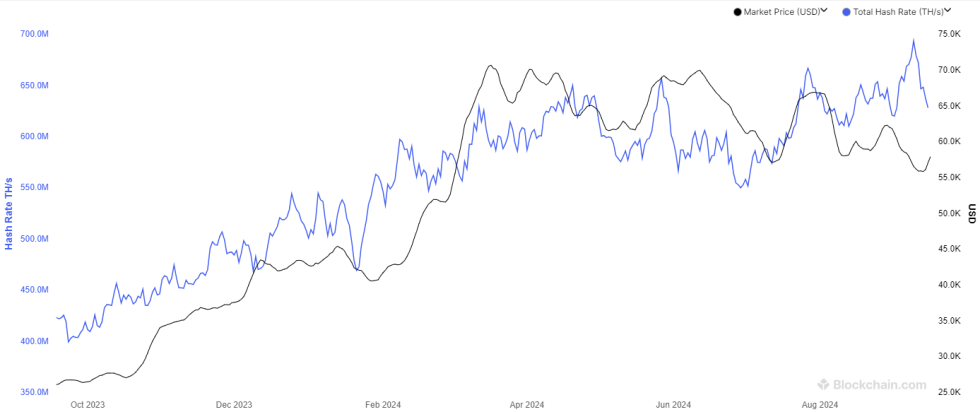Bitcoin Hashrate Plunges 10% After Setting ATH, But Why?
Data shows the Bitcoin Mining Hashrate has plunged almost 10% since the recent all-time high (ATH). Here’s what could be behind this trend.
Bitcoin Mining Hashrate Has Seen A Steep Drop Recently
The “Mining Hashrate” is an indicator that keeps track of the total amount of computing power that the miners as a whole have connected to the Bitcoin network. The metric is measured in terms of hashes per second (H/s) or, more practically, in terahashes per second (TH/s).
As BTC runs on a consensus mechanism based on the Proof-of-Work (PoW), miners naturally connect this computing power in order to solve mathematical puzzles and compete against each other to get a chance to add the next block to the network.
The incentive for competing on the network in this way is that the miner who adds the next block receives the block reward, a combination of the transaction fees and block subsidy, as compensation.
As such, for any miner, mining is only profitable if this reward outweighs the electricity cost that they spent on running their facilities. Whether miners as a whole are under stress or in a comfortable spot right now can be deduced by the trend in the Mining Hashrate.
When the value of this indicator goes up, it means new miners are joining the network and/or old ones are expanding their facilities. Such a trend implies the blockchain is looking lucrative to these chain validators.
On the other hand, the metric registering a decline suggests some of the miners are no longer finding BTC mining profitable, so they have decided to disconnect from the network.
Now, here is a chart that shows the trend in the 7-day average Bitcoin Mining Hashrate over the past year:

Looks like the 7-day value of the metric has plunged in recent days | Source: Blockchain.com
As displayed in the above graph, the 7-day average Bitcoin Mining Hashrate had seen a surge earlier in the month and had set a new ATH above 693 TH/s. In the week since this peak, however, the indicator has witnessed a fast decline of almost 10%, which has taken its value to 628 TH/s.
The answer behind why this trend has occurred could lie in the recent BTC price action. As mentioned before, miners earn their income through the block reward, which is made up of the transaction fees and block subsidy.
Out of these two, the block subsidy makes up the primary part of their revenue. A feature of the blockchain is that the block subsidy remains fixed in BTC value and is also given out at a fixed time interval, meaning that the only variable related to it is the USD price of the coin.
Thus, the revenue of the BTC miners directly correlates to the BTC spot value. As such, the earlier surge of the hashrate to the ATH was surprising, as Bitcoin had been declining when it occurred.
It’s possible that miners had been betting on the price to recover in the near future, but as it has clearly not panned out that way, they have decided to disconnect some machines from the network, which is why the 7-day average Hashrate has seen such a steep drop.
BTC Price
At the time of writing, Bitcoin is trading at around $58,600, up more than 6% over the past week.
The price of the coin appears to have overall moved sideways in the past month | Source: BTCUSDT on TradingView
Featured image from Dall-E, Blockchain.com, chart from TradingView.com
